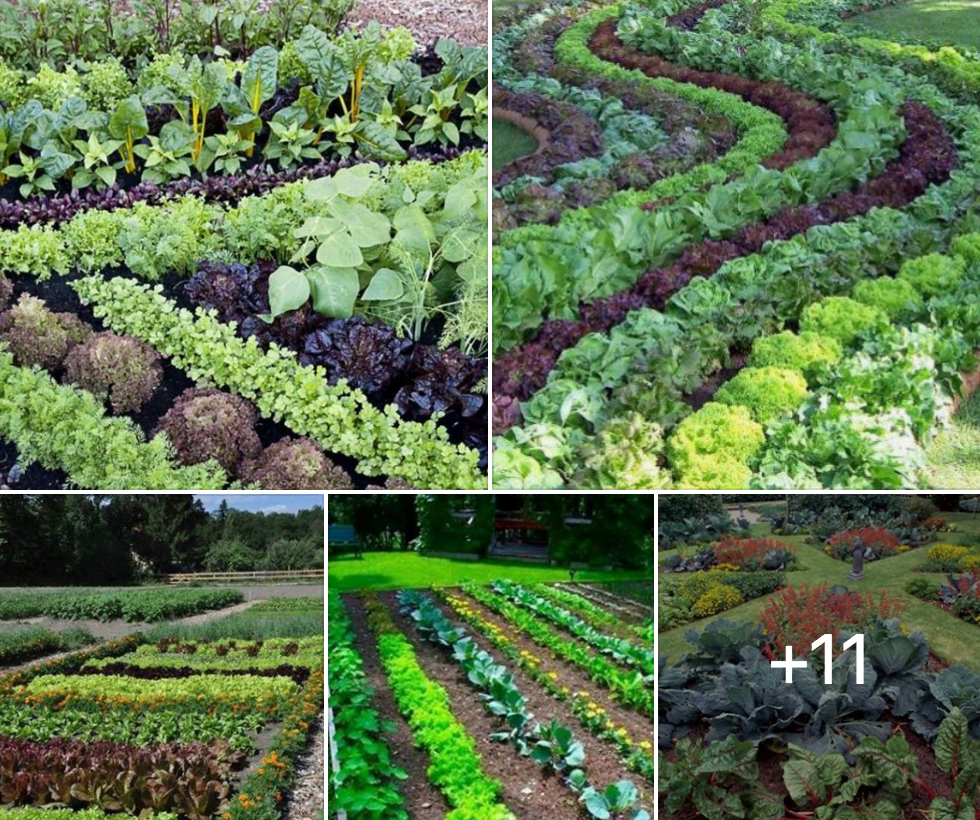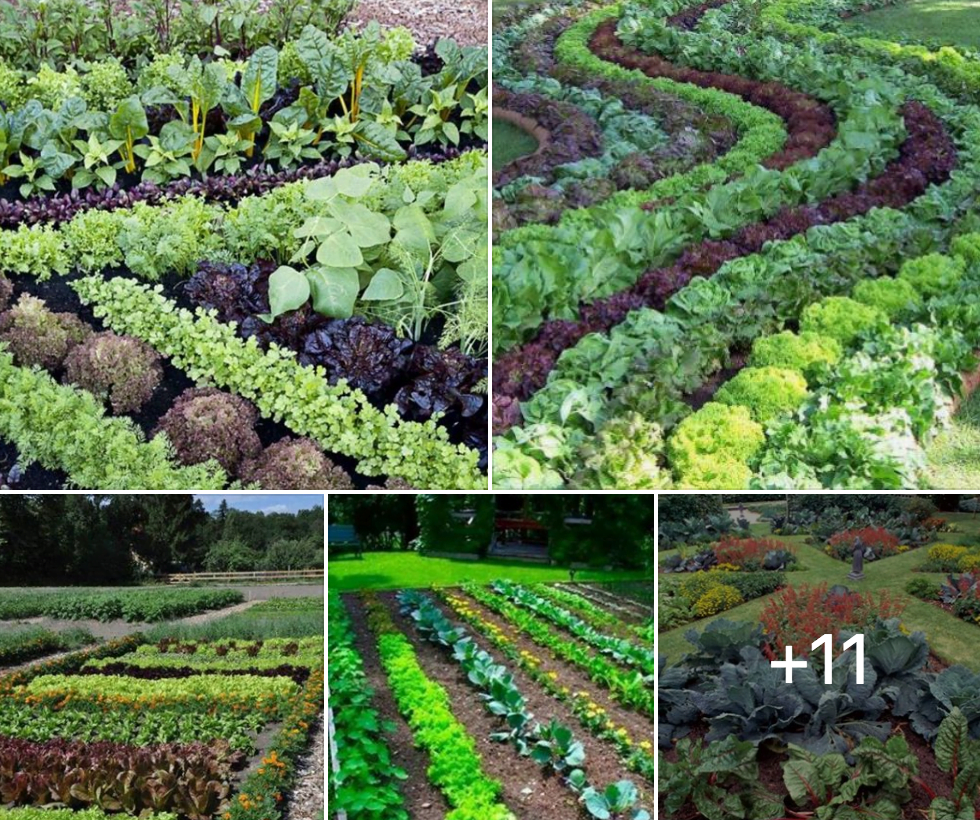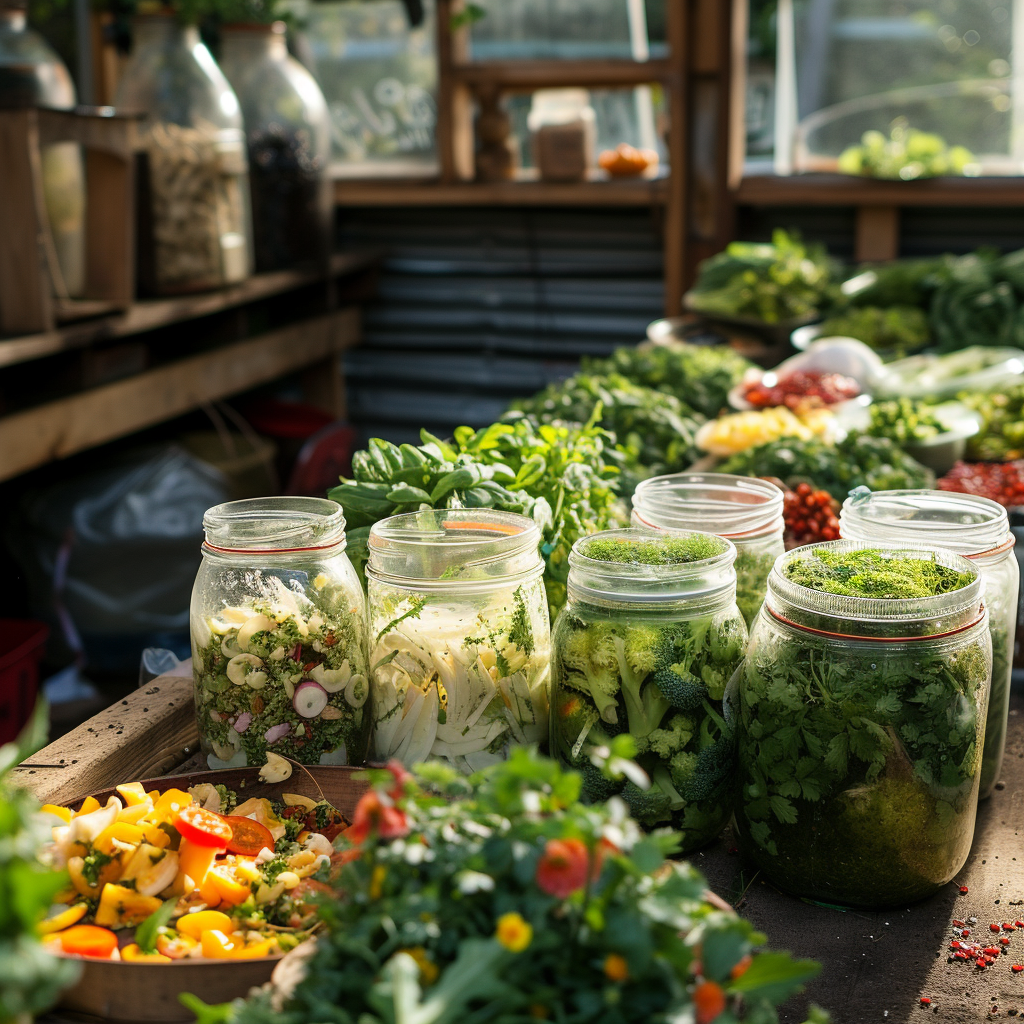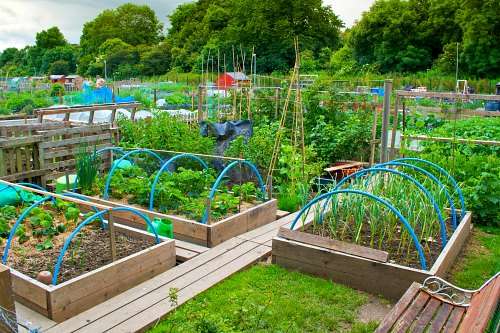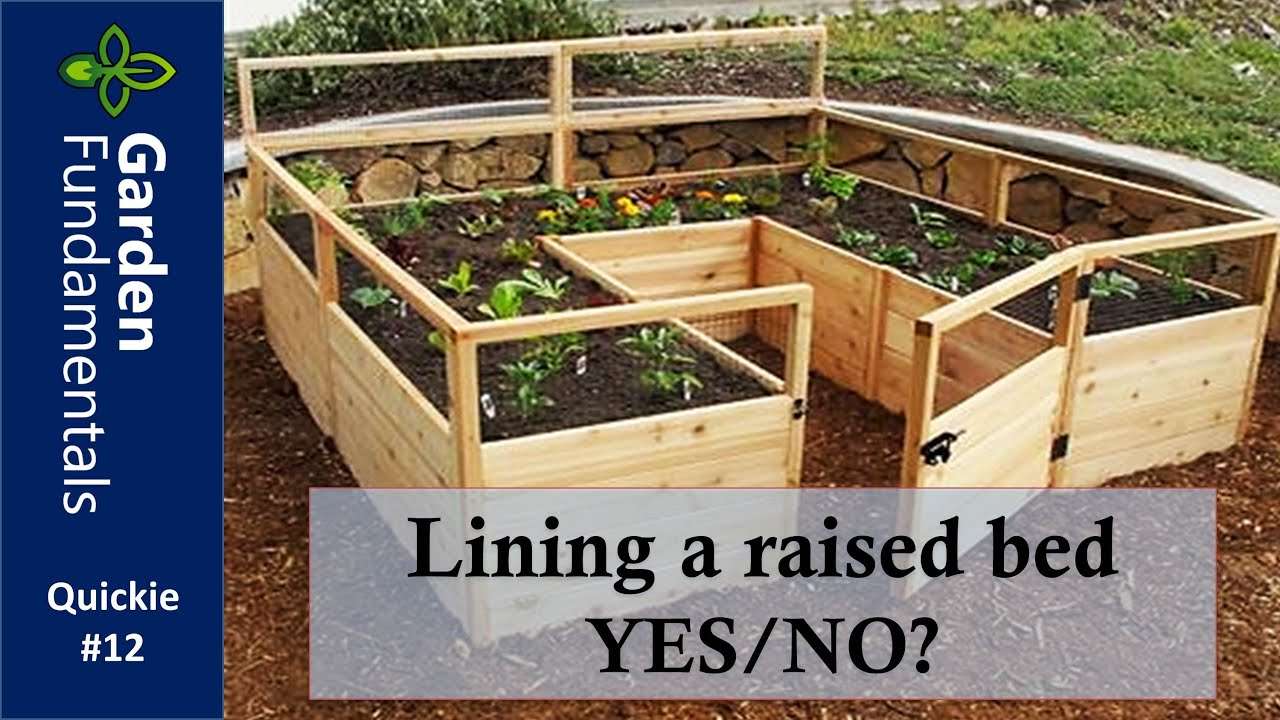In this article, we will discuss whether raised garden beds are a better option for off-grid living. We will explore the benefits and drawbacks of raised garden beds compared to traditional in-ground gardening. By the end, you will have a clear understanding of whether raised garden beds are a suitable choice for your off-grid lifestyle. So, let’s dive in and discover the advantages of raised garden beds in the context of off-grid living.
Are raised garden beds better for off grid living?
Off Grid Living
Off grid living is a lifestyle choice where individuals or families choose to live independently from public utilities such as electricity, water, and sewer systems. Instead, they rely on alternative sources such as solar panels, rainwater collection, and composting toilets. This lifestyle promotes self-sustainability, minimizing reliance on external resources and reducing environmental impact.
What is off grid living?
Off grid living is a way of life where you disconnect from the traditional utility grid and become self-reliant in meeting your basic needs. This includes generating your own electricity, collecting and managing water, and producing your own food. It requires careful planning and conscious decision-making in order to live a sustainable and fulfilling life off the grid.
Advantages of off grid living
There are several advantages of off grid living that make it an appealing choice for many individuals. First and foremost, it provides a sense of independence and freedom from the cost and constraints of traditional utility systems. By generating your own electricity through renewable sources, you can reduce or eliminate your energy bills. Additionally, off grid living allows you to have a smaller ecological footprint by relying on sustainable practices and minimizing waste. With no power outages or interruptions, you have greater control over your energy consumption and can prioritize using renewable sources. Off grid living also provides an opportunity to reconnect with nature and live a simpler, more sustainable lifestyle.
Challenges of off grid living
While off grid living offers numerous advantages, it also comes with its fair share of challenges. One of the major challenges is the initial cost of setting up the infrastructure required for self-sustainability, such as solar panels, rainwater harvesting systems, and composting toilets. These investments can be substantial, although they are often offset in the long run by the savings on utility bills. Another challenge is the need for careful management of resources, particularly water and energy. Off grid living requires a conscious effort to conserve and use resources efficiently. Depending on your location, you may also face challenges related to extreme weather conditions, such as harsh winters or scorching summers, which can impact your ability to generate electricity or grow food.
Importance of self-sustainability in off grid living
Self-sustainability is a key aspect of off grid living. By adopting sustainable practices, you reduce your dependence on external resources and minimize your impact on the environment. This includes growing your own food, managing your own waste, and generating your own energy. Self-sustainability not only ensures your basic needs are met but also empowers you to live a more environmentally conscious and resilient life. When you are self-sufficient, you have greater control over your resources and can adapt to changing circumstances more effectively. In off grid living, self-sustainability is not just a choice; it is a necessity for a sustainable and fulfilling life.
Gardening for Off Grid Living
Gardening plays a crucial role in off grid living as it enables individuals to produce their own food, reducing reliance on external food sources. Growing your own food not only provides a sense of self-sufficiency but also ensures access to fresh and nutritious produce. Moreover, gardening is a rewarding and therapeutic activity that allows you to connect with the natural world and promote biodiversity.
Why is gardening important for off grid living?
Gardening is important for off grid living as it allows you to become more self-reliant when it comes to food production. By growing your own fruits, vegetables, and herbs, you can ensure a steady supply of fresh and organic produce. This reduces your dependence on grocery stores and the industrial food system, which often involves long-distance transportation, chemical use, and excessive packaging. Gardening also provides an opportunity to reconnect with nature, improve mental well-being, and lead a healthier lifestyle.
Benefits of growing your own food off grid
There are numerous benefits of growing your own food off grid. Firstly, it allows you to have full control over the quality and safety of the produce. You can choose to grow your crops organically, without the use of harmful pesticides or chemicals, ensuring a healthier and more nutritious food source. Additionally, growing your own food reduces the carbon footprint associated with transporting and packaging food. It also promotes biodiversity by creating habitat for pollinators and other beneficial insects. Furthermore, gardening can be a cost-effective way of obtaining fresh produce, especially when you consider the long-term savings on grocery bills.
Factors to consider when gardening off grid
When gardening off grid, there are several factors to consider to ensure successful food production. Firstly, you need to assess the amount of available sunlight and choose a suitable location for your garden. Most vegetables require at least six hours of direct sunlight per day. Secondly, you need to consider the soil quality and fertility. Conduct a soil test to determine the pH level and nutrient content of your soil, and amend it accordingly. Thirdly, water management is crucial in off grid gardening. Evaluate your water sources and develop efficient irrigation systems, such as drip or mulch irrigation, to conserve water. Finally, consider the climate and weather patterns of your region. Choose plant varieties that are well-suited to your specific climate conditions to ensure optimal growth and yield.
Sustainable gardening practices for off grid living
In off grid gardening, it is important to adopt sustainable practices that promote ecological balance and minimize resource consumption. Firstly, choose organic and heirloom seeds or seedlings to maintain biodiversity and preserve traditional varieties. Avoid using synthetic fertilizers and pesticides, and opt for natural alternatives such as compost, organic matter, and companion planting. Implement water-saving techniques such as rainwater harvesting, mulching, and drip irrigation to conserve water. Additionally, practice crop rotation and intercropping to maintain soil fertility and minimize pest and disease problems. By following these sustainable gardening practices, you can ensure a thriving and resilient garden that supports your off grid lifestyle.
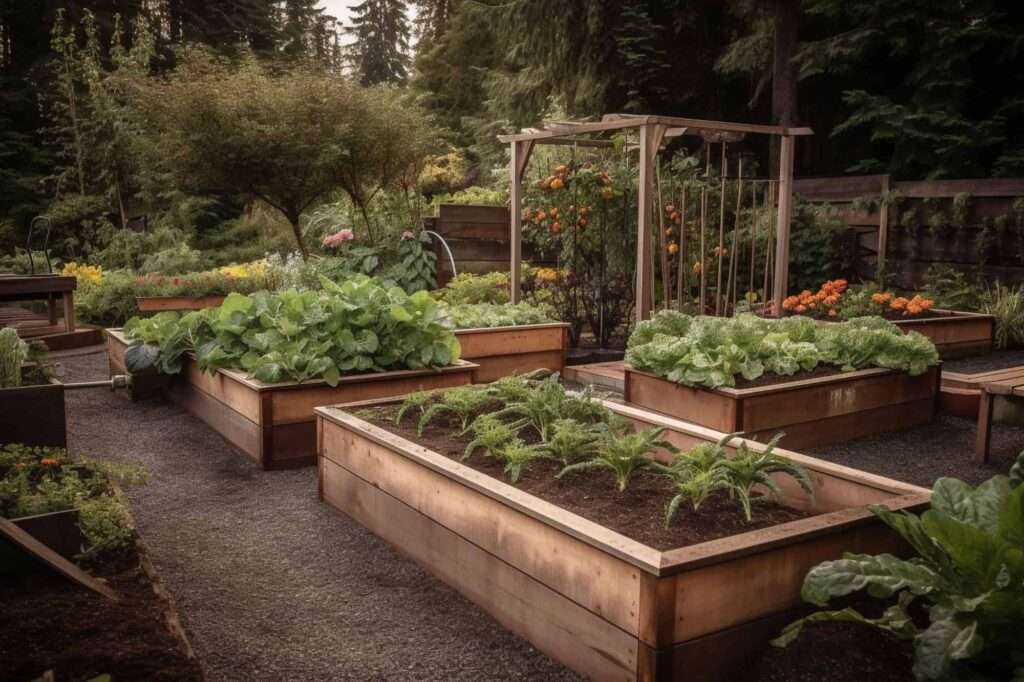
Raised Garden Beds vs. In-ground Gardens
When it comes to off grid gardening, the choice between raised garden beds and in-ground gardens is an important consideration. Both options have their own distinct advantages and disadvantages, which should be carefully evaluated based on your specific needs and circumstances.
Understanding raised garden beds
Raised garden beds are elevated planting areas that are built above the ground level. They are typically constructed using wooden planks, stone, or other suitable materials and filled with soil. Raised garden beds offer several benefits, such as improved drainage, better soil quality, easier access, and localized weed control. The elevated design of raised beds also reduces the strain on your back and knees, making gardening more comfortable and accessible.
Advantages of raised garden beds for off grid living
Raised garden beds offer numerous advantages for off grid living. Firstly, they allow for better control over the soil quality. By filling the beds with a custom blend of compost, soil, and amendments, you can create an optimal growing environment for your plants. This is particularly beneficial in off grid living, where soil quality may vary or be limited. Raised beds also provide better drainage, preventing waterlogged soil and ensuring excess moisture does not accumulate around the plant roots. Moreover, the defined boundaries of raised beds make it easier to manage and control weeds, reducing the need for manual weeding. This can be especially advantageous in off grid living, where time and energy are valuable resources.
Disadvantages of raised garden beds for off grid living
Despite their advantages, raised garden beds also have some disadvantages to consider. Firstly, they require an initial investment in materials and construction. The cost of building raised garden beds can be higher compared to in-ground gardens, especially if you opt for durable and long-lasting materials. Additionally, the elevated design of raised beds can be less efficient in terms of space utilization. The raised borders take up space that could otherwise be used for planting, potentially limiting the total growing area. This can be a significant factor to consider in off grid living, where maximizing space and productivity is crucial.
Pros and cons of in-ground gardens for off grid living
In-ground gardens, on the other hand, refer to the traditional method of planting directly in the ground without any raised borders or beds. While they may lack some of the advantages offered by raised garden beds, they also have their own unique benefits. In-ground gardens have the advantage of utilizing the full depth and width of the soil, allowing plants to develop deeper root systems. This can be advantageous in off grid living, where access to deep and nutrient-rich soil is desired. In-ground gardens also typically require less initial investment and can be easily expanded or modified as needed.
However, in-ground gardens may face challenges in terms of soil quality and management. The existing soil may require amendments to improve fertility and drainage, which can be more labor-intensive compared to filling raised beds with customized soil blends. Additionally, in-ground gardens can be more susceptible to weed growth and require more effort for weed control. This is an important factor to consider in off grid living, where minimizing maintenance and maximizing efficiency are often prioritized.
Maximizing Efficiency with Raised Garden Beds
If you have chosen to utilize raised garden beds in your off grid living setup, there are several strategies you can employ to maximize efficiency and productivity.
Space utilization in raised garden beds
One advantage of raised garden beds is the ability to make the most of limited space. With careful planning and efficient design, you can optimize the utilization of each bed. Consider using companion planting techniques to maximize space and promote plant health. Pairing plants that have mutually beneficial relationships can help deter pests, improve pollination, and enhance nutrient uptake. You can also utilize vertical growing techniques, such as trellises or stakes, to grow vining plants and save space. By taking advantage of vertical space and implementing companion planting, you can maximize the number of plants in each bed and increase overall productivity.
Optimal soil quality in raised garden beds
Raised garden beds offer better control over soil quality compared to in-ground gardens. Take advantage of this by creating an optimal growing environment for your plants. Start by preparing the soil mixture by combining compost, organic matter, and good-quality soil in appropriate ratios. This will provide the necessary nutrients and organic matter for healthy plant growth. Regularly amend the soil with compost or other organic matter to maintain fertility. Conduct periodic soil tests to ensure the pH level and nutrient content are within the ideal range for your chosen crops. By consistently maintaining optimal soil quality, you can maximize plant health and productivity in your raised garden beds.
Irrigation and water conservation in raised garden beds
Efficient water management is crucial in off grid living, and raised garden beds offer opportunities for water conservation. Install a drip irrigation system or soaker hoses to deliver water directly to the plant roots, minimizing evaporation and runoff. Mulch the surface of the raised beds to retain soil moisture, suppress weed growth, and regulate soil temperature. Consider collecting and utilizing rainwater to irrigate your raised garden beds, reducing your reliance on external water sources. Incorporate water-saving practices such as scheduling irrigation during early morning or late evening to minimize water loss due to evaporation. By implementing these strategies, you can conserve water and ensure efficient utilization in your raised garden beds.
Managing pests and diseases in raised garden beds
Raised garden beds can provide a level of protection against pests and diseases compared to in-ground gardens. The defined borders make it easier to implement physical barriers such as netting or floating row covers to prevent pest access. Additionally, the controlled environment of raised beds allows for more efficient pest management techniques, such as handpicking or trapping. It is important to regularly inspect your plants for signs of pests or diseases and take appropriate action to mitigate the issue. Consider incorporating companion plants that repel or deter pests, reducing the need for chemical interventions. By implementing proactive pest and disease management strategies, you can maintain plant health and productivity in your raised garden beds.
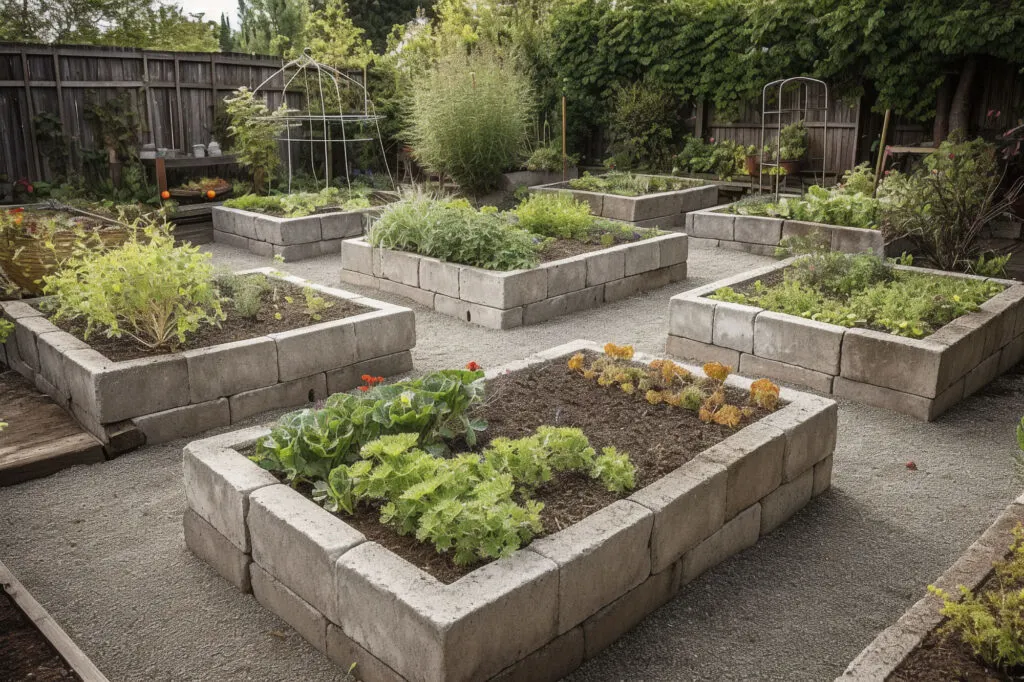
Sustainability of In-ground Gardens
While raised garden beds offer specific advantages in off grid living, in-ground gardens also have their own merits in terms of sustainability and productivity.
Benefits of in-ground gardens for self-sustainability
In-ground gardens promote self-sustainability in off grid living by utilizing natural soil resources to grow plants. These gardens tap into the existing soil ecosystem, allowing plants to develop deep root systems and access nutrients from a larger area. This can be particularly advantageous when the soil is rich in organic matter and nutrients, reducing the need for external fertilizers and soil amendments. Moreover, in-ground gardens have the potential to develop a balanced and self-regulating microclimate, which can support a diverse range of beneficial organisms, including microbes, earthworms, and beneficial insects. By harnessing the inherent sustainability of in-ground gardens, you can create a thriving ecosystem that supports your off grid lifestyle.
Promoting biodiversity in in-ground gardens
In-ground gardens have the potential to support a higher level of biodiversity compared to raised garden beds. The interconnectedness of the in-ground garden with the surrounding environment allows for greater species diversity and ecological interactions. Insects, birds, and other wildlife are more likely to visit an in-ground garden, enhancing pollination and natural pest control. The availability of native plants and a variety of habitats within the garden can attract a diverse range of beneficial organisms, contributing to a more balanced and resilient ecosystem. By promoting biodiversity in your in-ground garden, you can create a thriving and sustainable environment that supports your off grid lifestyle.
Soil conservation in in-ground gardens
In-ground gardens can play a crucial role in soil conservation and long-term soil health. The practice of in-ground gardening encourages the development of deeper and more structured soil profiles, which can improve water infiltration and retention. The presence of plant roots helps to stabilize the soil, reducing erosion and nutrient leaching. In-ground gardens also facilitate the natural breakdown of organic matter, adding to the soil’s fertility and structure over time. By practicing in-ground gardening, you contribute to the conservation and improvement of soil health, ensuring the long-term sustainability of your off grid garden.
Natural pest control in in-ground gardens
In-ground gardens have the advantage of supporting a more diverse population of beneficial insects and other organisms that contribute to natural pest control. Beneficial insects, such as ladybugs, lacewings, and hoverflies, are more likely to inhabit in-ground gardens due to the presence of diverse plant species and a larger habitat area. These beneficial insects prey on common garden pests, helping to control their populations naturally. Additionally, the interconnectedness of an in-ground garden with the surrounding environment allows beneficial insects to migrate more freely, improving their activity throughout the garden. By fostering natural pest control mechanisms in your in-ground garden, you can minimize the need for chemical pesticides and promote a more sustainable and balanced ecosystem.
Considerations for Off Grid Living
When embarking on off grid living, there are several important considerations to keep in mind to ensure success and self-sufficiency in your gardening endeavors.
Available resources for gardening off grid
Assess the resources available to you for off grid gardening, including water sources, sunlight exposure, and soil quality. Identify the existing infrastructure that can be repurposed or modified to support your gardening activities. For example, you may have access to rainwater collection systems, a greenhouse, or suitable gardening tools and equipment. By utilizing the resources at hand, you can minimize costs and improve efficiency in your off grid garden.
Climate and weather factors in gardening off grid
Climate and weather conditions play a significant role in the success of off grid gardening. Understand the specific climate zone you are in and the associated challenges and opportunities it presents. Determine the average frost dates, the length of the growing season, and the typical weather patterns throughout the year. This knowledge will help you select suitable plant varieties and plan your planting and harvesting schedules accordingly.
Suitable plant choices for off grid gardening
Choose plant varieties that are well-suited to your specific climate and growing conditions. Consider factors such as temperature tolerance, disease resistance, and water requirements. Select plants that are known to thrive in your region and have a high nutritional value. Additionally, prioritize heirloom and open-pollinated varieties to preserve genetic diversity and promote self-sufficiency through seed saving. By choosing appropriate plant varieties, you increase the likelihood of a successful and productive off grid garden.
Maintenance and seasonal adjustments in off grid gardens
Off grid gardens require regular maintenance and seasonal adjustments to ensure ongoing productivity and success. This includes tasks such as watering, mulching, weeding, and pest control. Develop a gardening calendar or schedule that outlines the necessary activities for each season. Consider the availability of resources and the energy required for maintenance tasks when planning your off grid garden. By staying on top of maintenance and making seasonal adjustments, you can ensure a thriving and productive garden throughout the year.
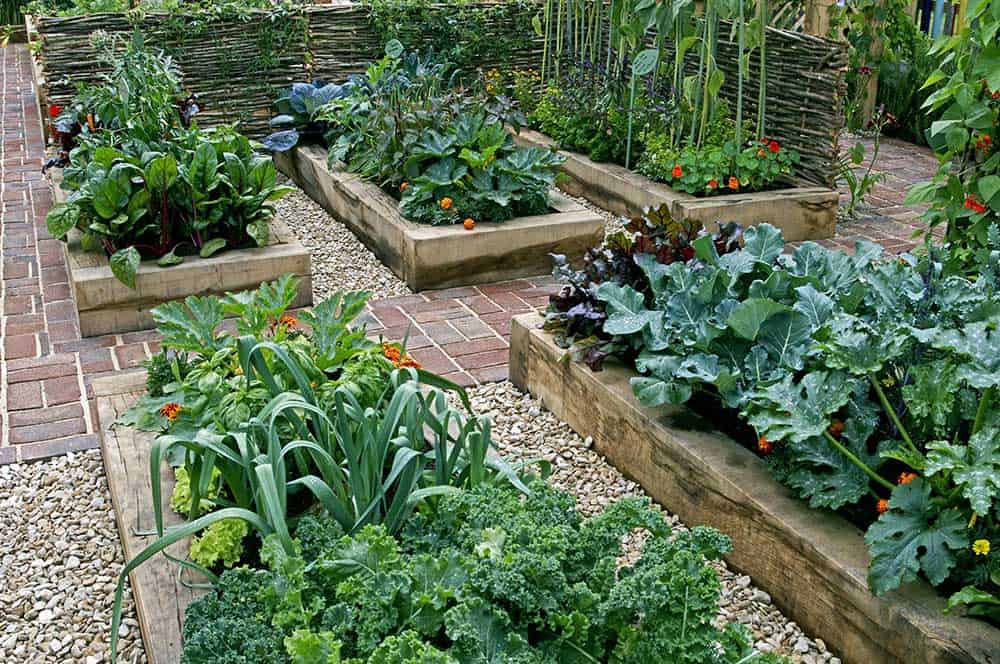
Economic Factors
When considering the use of raised garden beds or in-ground gardens for off grid living, economic factors should also be taken into account.
Initial investment costs for raised garden beds
Raised garden beds typically require an initial investment in materials and construction. The cost of building raised beds can vary depending on the materials chosen, the size and number of beds, and the specific design features. Wooden planks, bricks, or stones are common materials used for raised beds, each with its own cost considerations. Additionally, soil, compost, and other amendments may be needed to fill the beds, adding to the overall cost. It is important to weigh the initial investment against the long-term benefits and savings that raised garden beds can provide in terms of improved soil quality, enhanced productivity, and reduced maintenance.
Long-term cost savings with raised garden beds
While there may be an initial investment cost associated with raised garden beds, they can provide long-term cost savings in off grid living. By optimizing soil quality, raised beds can lead to improved plant health and productivity, resulting in higher yields of fresh produce. This can translate to savings on grocery bills and a reduced need to rely on external food sources. Additionally, raised garden beds promote efficient space utilization and localized weed control, reducing the time and effort required for maintenance. By considering the long-term cost savings associated with raised garden beds, you can make an informed decision about their suitability for your off grid living setup.
Cost comparison of in-ground gardens for off grid living
In contrast to raised garden beds, in-ground gardens typically require less initial investment. The cost of in-ground gardens primarily involves preparing the soil, acquiring suitable seeds or seedlings, and implementing irrigation and pest control measures. Depending on the condition of the existing soil, you may need to invest in soil amendments or fertilizers to improve fertility. However, once established, in-ground gardens can be maintained with minimal ongoing costs. By considering the cost comparison between raised garden beds and in-ground gardens, you can determine the most financially viable option for your off grid living situation.
Value of self-sufficiency in economic terms
When evaluating the economic factors of raised garden beds versus in-ground gardens for off grid living, it is important to consider the value of self-sufficiency. By growing your own food, you reduce your reliance on external food sources, which can be subject to price fluctuations and availability issues. The ability to produce your own fresh and nutritious food can lead to cost savings, improved food security, and a greater sense of independence. Additionally, the skills and knowledge gained through off grid gardening can have long-term economic benefits, as you develop a valuable self-sufficiency skillset that can be applied beyond the garden.
Environmental Impacts
Gardening, whether using raised beds or in-ground gardens, has important environmental impacts that should be considered in the context of off grid living.
Reducing environmental footprint with raised garden beds
Raised garden beds offer opportunities to reduce your environmental footprint in off grid living. By utilizing compost, organic matter, and soil amendments, you can create a healthy and fertile growing environment without relying on synthetic fertilizers or pesticides. This reduces the release of harmful chemicals into the environment and promotes a more sustainable approach to gardening. Additionally, the controlled environment of raised beds allows for efficient water management, minimizing water waste and promoting water conservation. By implementing these practices, you can contribute to reducing your overall environmental impact.
Preserving natural habitats in off grid gardening
Off grid gardening, whether through raised beds or in-ground gardens, provides an opportunity to create and preserve natural habitats within your surroundings. By integrating native plants and flowers into your garden, you attract and support a diverse range of pollinators, birds, and beneficial insects. These organisms contribute to the overall health and biodiversity of the ecosystem. Incorporating features such as bird feeders, bird baths, or insect hotels can further enhance the habitat value of your off grid garden. By preserving natural habitats, you play a crucial role in promoting biodiversity and ecological balance in your off grid living environment.
Promoting ecological balance with in-ground gardens
In-ground gardens also contribute to promoting ecological balance in off grid living. By utilizing the existing soil ecosystem, you support the growth of diverse plant species and beneficial organisms. The interconnectedness of an in-ground garden with the surrounding environment allows for natural ecological interactions and nutrient cycling. The presence of a thriving and balanced ecosystem benefits not only your garden but also the overall health of the surrounding land. By promoting ecological balance with your in-ground garden, you contribute to the conservation of biodiversity and the preservation of natural resources.
Mitigating climate change through sustainable gardening
Sustainable gardening practices, whether employed in raised beds or in-ground gardens, can contribute to mitigating climate change. By reducing reliance on synthetic fertilizers and pesticides, you minimize the release of greenhouse gases and other harmful substances into the atmosphere. Additionally, the use of organic matter and compost in your garden promotes carbon sequestration in the soil, helping to offset carbon emissions. Furthermore, sustainable watering practices, such as rainwater harvesting and efficient irrigation, conserve water resources and reduce energy consumption associated with water pumping and treatment. By practicing sustainable gardening, you play a role in mitigating climate change and creating a more resilient environment.
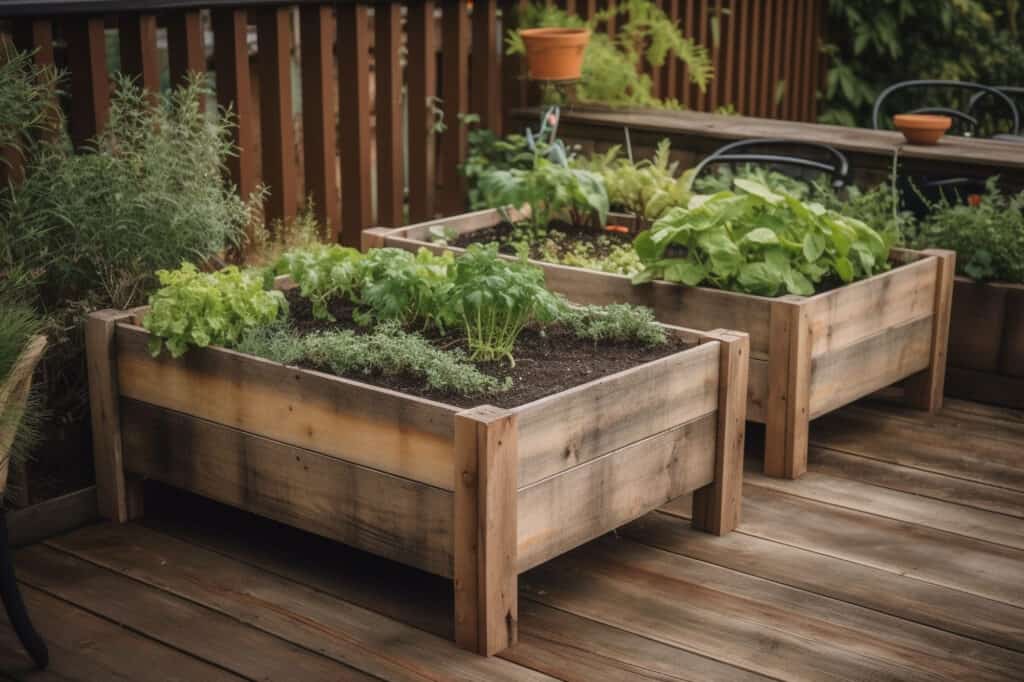
Community Engagement
Engaging with the off grid living community and participating in collaborative gardening initiatives can greatly enhance the experience and benefits of gardening for self-sufficiency.
Collaborative gardening initiatives in off grid communities
Off grid living communities often foster a sense of collaboration and shared responsibilities. Collaborative gardening initiatives can be established within these communities, pooling resources, knowledge, and labor to create a more robust and productive gardening system. Community gardens, where individuals or families contribute their skills, time, and resources to a collective garden, can provide a sense of camaraderie and shared success. By participating in these initiatives, you not only benefit from shared expertise but also build lasting relationships within the off grid community.
Sharing surplus produce in off grid living
Off grid living often results in an abundance of fresh produce during peak harvest seasons. Sharing surplus produce with your off grid neighbors and community members can foster a sense of community and ensure that the harvest is not wasted. Establishing systems for sharing and exchanging surplus produce, such as community food swaps or bartering, can strengthen community bonds and reduce food waste. By sharing your bounty and receiving from others, you build a sense of interdependence and mutual support within the off grid living community.
Educational opportunities in off grid gardening
Off grid gardening provides numerous educational opportunities, both for individuals and the larger community. Within an off grid living community, individuals can offer workshops, classes, or hands-on demonstrations to share their knowledge and skills with others. This can include topics such as seed starting, composting, plant propagation, or natural pest control. Additionally, off grid gardening can be incorporated into homeschooling or educational programs, providing children with valuable hands-on learning experiences. By embracing opportunities for education and knowledge sharing, you contribute to the growth and resilience of the off grid living community.
Building a sense of belonging through community gardens
Community gardens play a significant role in fostering a sense of belonging and community cohesion in off grid living. These shared spaces provide opportunities for individuals to come together, work collaboratively, and share in the joys and challenges of gardening. Community gardens can serve as meeting places, social hubs, and sites for celebration and connection. By participating in community gardens, you contribute to the building of a strong and supportive off grid living community.
Conclusion
When considering raised garden beds versus in-ground gardens for off grid living, it is important to carefully weigh the advantages and disadvantages of each option. Raised garden beds offer improved soil quality, better water management, and localized weed control, but they may require a higher initial investment and limit space utilization. In-ground gardens promote self-sustainability, biodiversity, and natural pest control, but may require more effort for soil preparation and weed management. The choice between raised garden beds and in-ground gardens ultimately depends on your specific needs, resources, and circumstances. By considering individual preferences and focusing on the core goals of self-sufficiency and sustainability, you can make an informed decision that supports your off grid living journey. With proper planning, thoughtful consideration of available resources, and a commitment to responsible gardening practices, both raised garden beds and in-ground gardens can contribute to a fulfilling and successful off grid lifestyle.
